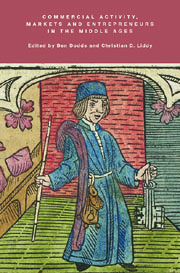 Commercial Activity, Markets and Entrepreneurs in the Middle Ages
Commercial Activity, Markets and Entrepreneurs in the Middle Ages Published online by Cambridge University Press: 05 February 2013
This essay will consider a negative aspect of market production: the losses caused by employee embezzlement or fraud. Between 1261 and 1268 Robert le Carpenter (Robert Carpenter II, 1230–1280), of ‘Hareslade’ (modern Haslett Farm) near Shorwell on the Isle of Wight, compiled a formulary, in Latin, containing a collection of form letters, legal texts and other model documents having to do with law and administration. Carpenter, who was probably a freeholder and a former bailiff of William de Insula, lord of the manor of Shorwell, copied into his holograph formulary many texts from other collections. However, he also added some original material, including detailed instructions for half a dozen ways in which a reeve, bailiff or shepherd could embezzle from his lord or commit some other kind of fraud. Sometime after 1283 Carpenter's eldest son, Robert Carpenter III (b. 1258), compiled his own formulary and included within it a copy of his father's text.
Carpenter's matter-of-fact instructions for how to commit fraud appear to be unique for medieval England. However, although both Noël Denholm-Young and Dorothea Oschinsky commented briefly on this portion of Carpenter's text, and Oschinsky published a transcription of it, to date no one has published a translation of these instructions or examined them in detail. This essay will investigate Carpenter's text, and will also explore the subject of employee fraud more generally, as reflected in prescriptive texts such as household regulations, instructions for manorial officers and other advice manuals, and in accounts of embezzlement cases.
To save this book to your Kindle, first ensure no-reply@cambridge.org is added to your Approved Personal Document E-mail List under your Personal Document Settings on the Manage Your Content and Devices page of your Amazon account. Then enter the ‘name’ part of your Kindle email address below. Find out more about saving to your Kindle.
Note you can select to save to either the @free.kindle.com or @kindle.com variations. ‘@free.kindle.com’ emails are free but can only be saved to your device when it is connected to wi-fi. ‘@kindle.com’ emails can be delivered even when you are not connected to wi-fi, but note that service fees apply.
Find out more about the Kindle Personal Document Service.
To save content items to your account, please confirm that you agree to abide by our usage policies. If this is the first time you use this feature, you will be asked to authorise Cambridge Core to connect with your account. Find out more about saving content to Dropbox.
To save content items to your account, please confirm that you agree to abide by our usage policies. If this is the first time you use this feature, you will be asked to authorise Cambridge Core to connect with your account. Find out more about saving content to Google Drive.